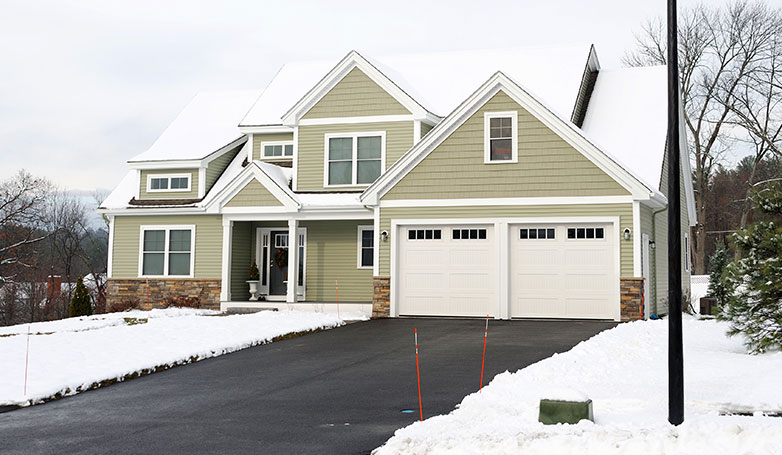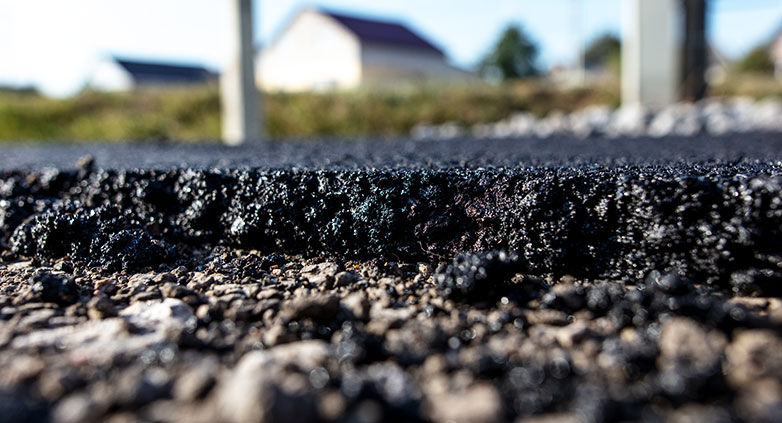Advantages of Asphalt – Tips for Your Next Project
Asphalt or concrete are widely used to finish the majority of the residential and commercial driveways. And when you want to pave a new driveway, parking lot, etc, or refinish an existing one, you will want to consider the material that would work best for your needs.
Although asphalt and concrete are both cost-effective, asphalt has lots of advantages over concrete. If you are choosing your surface paving material, you would most likely pick asphalt; not because it is generally used everywhere, but because of its many benefits.
Asphalt is mainly used for road construction due to its many advantages over some of the alternative pavement materials, such as concrete. Hence, it is often advised to use asphalt when carrying out any paving projects in your home.
Here are the advantages of asphalt, a recommended material for your surface:
- Cost-effective
- Durable
- Safe to use
- Comfortable and attractive
- Recyclable
- Naturally flexible
- Easy to maintain
- Quick to construct
Asphalt is cost-effective
There is a fair chance that you’ll find yourself trying to decide between concrete and asphalt while you’re on the market for a new driveway. Although both materials have their advantages, asphalt is generally the way to go if you’re concerned about keeping within your budget.
Also, asphalt pavements provide a more uniform, smooth road surface that makes the road safe and saves money. As a result, roads constructed with asphalt decrease wear and tear on vehicles due to fewer road bumps, lowering your vehicle’s operating costs.
Asphalt roads can also be constructed more quickly, and cost-effectively than other pavements and can be built as a permanent pavement that requires only occasional maintenance to stay in good condition.

Asphalt is durable
The durability of asphalt makes it possible to:
- Withstand extreme weather conditions
- Endure occasional overload
- Be viable for several decades
Toughness and durability are the two characteristics that asphalt is known for; hence, lots of people prefer it as the best choice material for any paving project. Its durability and sustaining existence have also highly attracted both state and federal government preference for all road projects.
If you take proper care of your asphalt pavements, it will serve you excellently for years to come. An asphalt driveway’s average lifespan is around 15 years. The good thing is, the maintenance needed to get this kind of lifespan out of your driveway is low.
All pavements built with asphalt are flexible with a bridging action, meaning they can endure occasional overload without serious damage. They can be built to adjust to any traffic, soil, and material conditions. Asphalt only needs occasional maintenance to stay in good shape forever.
You may be wondering the secret behind the durability of asphalt pavements; the reality is, they are often constructed using thick base courses to carry the principal load above an unbound granular layer. After that, a strong-load holding intermediate course is put above the base course. Next, a 30- 40 surface course follows the intermediate (binder) course.
Properly designed, built, and maintained intermediate and base courses continue to be strong and viable for several decades and often without ever requiring complete rebuilding. One wonderful thing to know about asphalt is that, even after you strip old asphalt from your pavement, it will continue existing for a longer time.
Asphalt is a durable material that is weather-resistant and can be used to construct driveways in both winter and summer. It can even withstand extreme weather conditions and the heaviest of truck loads. It is also possible to design asphalt to suit a particular purpose!

Asphalt is safe to use
Safety characteristics of asphalt include:
- Its smoothness helps prevent driver fatigue
- Its dark color helps melt snow and ice
- It offers high contrast for lane markings
- It minimizes highway accidents and fatalities
Asphalt pavement can be designed to facilitate water drainage, prevent skidding, and protect drivers during severe weather conditions. When you drive on roads built with asphalt, its smooth surface will provide optimum tire contact with the driveway, increasing skid resistance. Its dark color helps melt snow and ice, reduces glare, and offers high contrast for lane markings.
Asphalt roads can be constructed quickly, enabling contractors to efficiently carry out construction without delay, significantly decreasing safety risks for workers and road users.
Studies have also shown that asphalt roads are smoother than concrete ones and help prevent driver fatigue, meaning that you need not worry about feeling overtired while driving even on long journeys.
The invention of colored or textured surfaces has been another latest asphalt advancement. These are progressively used to make it easier for you to define lanes set aside for particular purposes, such as bus lanes, bus stops, and bike paths, as a protection measure. Colored asphalt is often used to signal unsafe areas like concealed junctions/sharp curves and areas such as outside schools requiring extra safety precautions to anyone driving on the road.
A particular type of road surface called open-graded asphalt can reduce splash and spray during rainstorms and minimize highway accidents and fatalities. Materials for asphalt paving often prevent potentially hazardous and costly pavement blowups.

Asphalt is comfortable
What characterizes asphalt pavement’s comfortability?
- Smoothness
- Quietness
- Attractive look
Pavement designed with asphalt creates quiet and smooth rides with pleasant aesthetic and low rolling resistance. If your driveway is designed with asphalt, you are sure to get consistent comfortability on the go. Airport users also benefit from these features because runways and taxiways designed with asphalt offer safer landings and takeoffs since such surfaces are smoother and easier to maintain.
Some of the features of asphalt pavement responsible for its comfortability are:
Smoothness
Studies have shown that roadway smoothness is a defining factor of vehicle fuel economy, meaning the smoother the pavement, the lower your vehicle consumes fuel. Asphalt pavement is usually smooth and often lasts longer because trucks’ tires roll more quickly over the pavement rather than bouncing on bumps. Such bouncing often speeds up road degradation.
Asphalt is a flexible pavement constructed in different layers with a consistent flow of material moving through the asphalt paver. There are no construction joints required. This method of construction provides the smooth, quiet ride that you love and improves fuel economy, decreases your vehicle wear and tear, leading to prolonged pavement life.
Quietness
Road noise is a typical type of environmental pollution. And as widely known, the perfect way to reduce road noise is to treat the cause from its source. The noise created by the rear wheel-pavement interface (noise that affects you as you go about your everyday lives) can be greatly reduced by paving roads and highways with asphalt.
Instead of constructing expensive, unsightly noise walls, it is more efficient and cost-effective to pave driveways with asphalt. Road noise can cause distractions in your car and at home (when you are going about your daily activities). Pavement built with asphalt reduces noise from vehicle tires significantly. Asphalt roads also lower the need for expensive and hideous sound barriers
Aesthetically pleasing
Since it is important to have your pavement built with asphalt to provide a smooth surface to drive on, it is also very pertinent that it is aesthetically pleasing for those going on it. When you talk of beauty, asphalt pavement is a thing to look at.
The rich black color of asphalt offers a highly appealing surface hue for every road surface. Also, you can easily clean your asphalt pavement of oil stains, dirt marks and other stains at inexpensive cost. This is the reason your asphalt pavement will stay excellently attractive even after several years of usage.
To maintain this beautiful look in your home, ensure you seal-coat all your asphalt pavements, roadways, parking lots, and driveways after installation and reseal them every 2-3 years. This would save you lots of money. They should also be labeled and striped to increase safety and enhance the color contrast on the beautiful pavements.
Investing in new roads means improving the appearance of our communities and in the welfare of our people.

Asphalt is recyclable
What benefit does recycling asphalt offer?
- It minimizes our waste problem
- Preservation of our natural resources
- It can help generate job opportunities
- It can be reused overtime, saving money
Asphalt is the most recycled material in the United States and is 100% reusable. In potential paving projects, old pavement can be removed, squashed, and blended with fresh asphalt for reuse, lowering its impact on the environment.
Asphalt pavements are also rendered sustainable by it.
Creating new asphalt pavements requires a few new petroleums (bitumen), and about 80 million tons of new aggregate are still in the reserves. Researchers are working hard to build a pavement utilizing 100% recycled asphalt.
Asphalt can be used repetitively, and its life-cycle never ceases. It is also possible to dig up asphalt roads and reuse them again afterward. This is what makes asphalt such a famous material in this modern time. If you use asphalt, you are preserving our natural resources by recycling the same material over again.
Recycling asphalt driveways, despite its elaborate process, will help local councils save money from having to rebuild roads with new materials. The act of recycling also creates new market opportunities and, at the same time, helps to create a greener world in the long run.
The availability of recycled asphalt on the market goes beyond meeting the enormous demand for asphalt, but as more asphalt recycling plants are built, it can help generate job opportunities.
Recycling asphalt also helps to minimize our waste problem, ensuring that less material is transformed into waste, and hence, put into landfills! Asphalt also protects the environment because when it is spilled, it will not run into our rivers, as it converts into solid mass very easily.
Asphalt is naturally flexible
Have you ever been nervous as a guest pulled into your roadway in a big truck? It would be hard for you not to visualize what sort of damage such a large vehicle might be exacting on your driveway. You do not need to worry much about this issue with an asphalt driveway.
Generally, asphalt surfaces are properly formulated and can be ‘custom-made or designed to support a particular driveway and climatic conditions.
There are particularly unique asphalt mix solutions available for motorways, suburban, rural and urban roads, and their versatility is especially useful in dealing with the stresses of large bridge traffic loads. In terms of flexibility, asphalt is the best option for any road.
It is not just the material itself, but because it can be constructed to offer effective solutions for all sizes and types of roads, cycle paths, lanes, and so on. The flexible formulation of asphalt mixtures to particular regions of the world makes it possible for asphalt to conform to its environment and withstand any weather conditions.

Asphalt is easy to maintain
What makes asphalt easy to maintain?
- It can not be damaged by freeze-thaw activity
- It can be upgraded easily
If your asphalt pavement starts to show some linear cracking, you can fix it easily at inexpensive costs. Since asphalt pavements have no joints to fix and are not damaged by freeze-thaw activity, it is much less costly to maintain.
The crack sealant materials you need to maintain your asphalt driveway are readily available at home remodeling retailers. It is not expensive and can easily be applied on your own, even if you have practically no prior paving experience.
As traffic levels increase, asphalt-surfaced roads are easy to upgrade. Instead of reconstructing, the existing surface can be improved by adding an overlay or lane widening. This flexibility of the application also ensures that asphalt roads stay partially open when being upgraded and can be reopened easily without the need for lengthy curing times, helping to keep traffic going.
Furthermore, regular preventive maintenance such as crack filling, seal coating, sweeping, and general upkeep can prolong the lifespan of your asphalt driveway to 20 years or beyond.
Asphalt is quick to construct
Paving with asphalt significantly decreases construction project time and removes the lengthy curing periods associated with concrete. This is vital for general road upkeep to maintain roads for the road structure’s longevity, providing a secure and smooth road surface for vehicles.
Asphalt is ready for use immediately as it is compacted and cooled, implying that roads do not have to stay closed for curing. This increases the flow of traffic and reduces closures and delays that may irritate you while driving.
To get the most out of your paving projects, ensure you hire a professional paving company with an excellent track record. You can do this by doing a little search online to review their past portfolio.
Conclusion
The advantages of asphalt as pavement material can not be overemphasized. Its popularity and wide acceptance as the ideal material for paving roadways, parking lots, driveways, and more is due to its many benefits. If you are considering any paving project for residential or commercial use, you have lots of reasons to choose asphalt as the perfect material. This ensures you get your desired expectations.


